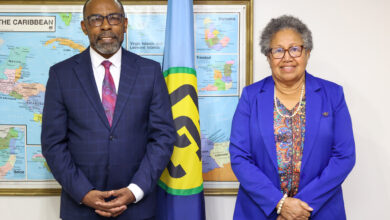Salutations:
This signing ceremony marks the start of the Annual CARICOM/USAID Portfolio Review during which the CARICOM Region through the CARICOM Secretariat will have the opportunity to discuss with our development partners from USAID the priorities, prospects and progress associated with USAID technical assistance to the Region.
We hope to determine at this meeting how best to target USAID-funded cooperation over the next five years, within the context of emerging regional development priorities and against the backdrop of an assessment of the current programme. The substantive programme areas which will be addressed at the Review Meeting will be Open Trade/Competitiveness, HIV/AIDS, and the Reconstruction of Grenada.
The inauguration of this new five-year programme, which will attract US$81 million so generously allocated by USAID in the areas of Trade and HIV/AIDS, is another important stage in what has been a strong, substantial and strategic cooperative relationship between USAID and the CARICOM Region. Such cooperation has served the Region very well, impacting positively on various aspects of our social and economic development. This signing ceremony, therefore, marks another significant milestone in the CARICOM/USAID Cooperation relationship.
The progress made in addressing some of the Region’s critical development priorities, will be assessed in this meeting against the background of current strategic objectives:
1. Improved business environment to meet international standards; 2. Improved environmental management by public and private entities; and 3. Increased effectiveness and efficiency of legal systems in CARICOM.
Among the many success stories of the current programme is the establishment and operationalisation of the CARICOM Legal Drafting Facility, which provides a critical part of the institutional capacity-building necessary for the implementation of the CARICOM Single Market and Economy (CSME). The Region would like to take this opportunity to extend our appreciation to USAID for the significant role it has played in making this legal infrastructural necessity a practical reality, and report that it has been an effective instrument in advancing the integration process.
The new programme, which will take effect from January 2005, will be centred around a new Regional Strategic Objective; that is, Caribbean Region positioned to succeed in an open trade environment. This approach, we understand, has been designed to have maximum impact on the most critical challenges by narrowly focusing precious resources. Thus, the budgeted resources in the amount of US$62,500,000 will be utilised to produce results addressing the necessary legal infrastructure; compliance with trade agreement requirements; enabling the business community to be internationally competitive; and strengthening the environmental and disaster prevention frameworks for growth.
The signing of this new framework agreement comes at a time when the Region is poised to complete the establishment of the CSME. At a Special Meeting of the Conference of Heads of Government to consider the establishment of the CSME, which concluded in Port of Spain last night, the Heads took stock of the significant progress made and declared their resolve to advance the regional integration movement. One of the significant decisions made was the financing of the Work Programme of the CSME and the establishment and operationalising of a Regional Development Fund. This latter, which is an essential element to enable Member States to liberalise their markets without undue dislocation, must be in place by 2005.
The support of USAID for the process of regional integration by way of tangible technical assistance is very much appreciated and we extend our thanks and our gratitude.
The second major Project that will occupy our attention today has as its Regional Strategic Objective: HIV Transmission Reduced in Target Countries in Most-at-Risk Populations and Impact of HIV/AIDS Mitigated in the Region. As you are aware, the Region is facing the decimation of large portions of the labour force as a consequence of the HIV/AIDS epidemic. The Caribbean has been identified as the second most affected Region in the world, with an adult HIV prevalence rate of 2.2 percent, a statistic which we quote merely in order to illustrate the magnitude of the problem confronting us.
In several countries of the Region, HIV/AIDS has become the leading cause of death. The social consequences are obvious, but the economic impact is also devastating. A recent study estimated that by 2005, 4.0 per cent and 6.4 per cent of the GDP of two of our countries could be lost due to HIV/AIDS.
The CARICOM Regional response to the epidemic is informed by the Regional Strategic Framework, which is being implemented by the Pan Caribbean Partnership Against HIV/AIDS (PANCAP).
USAID-funded HIV/AIDS assistance focuses on supporting CARICOM’s regional efforts under the strategic framework to expand access to HIV care and treatment, improve regional and national monitoring of the epidemic, and reduce further transmission of HIV by targeting HIV prevention efforts to those most-at-risk. Thus, the key result areas identified in the Project, for which this agreement we will be signing provides US$18.5 million, are: expanded access to prevention and treatment services; improved availability and use of accurate and reliable information on HIV/AIDS; and expanded access to risk-reduction-behaviour-changes.
The Governments of the Region and the PANCAP welcome this tremendous support from USAID towards stemming the tide of this epidemic. We are confident that the joint efforts of the Regional partner institutions in implementing this Project as part of an integrated programme within the Regional Strategic Plan, will result in maximised impact and sustainability.
The Caribbean Community also acknowledges with gratitude the indication of support in the amount of US$44 million from USAID toward the Reconstruction of Grenada. While the Signing Ceremony for the Project of assistance to Grenada is scheduled to take place in Grenada during the International Donor Conference being convened there on 19 November 2004, we look forward to the discussions on this vital area later today.
All of these areas of cooperation are at the heart of our efforts to provide for the economic and social development of the peoples of the Region. The support of USAID for these efforts and for the process of regional integration by way of tangible technical assistance is very much appreciated.




